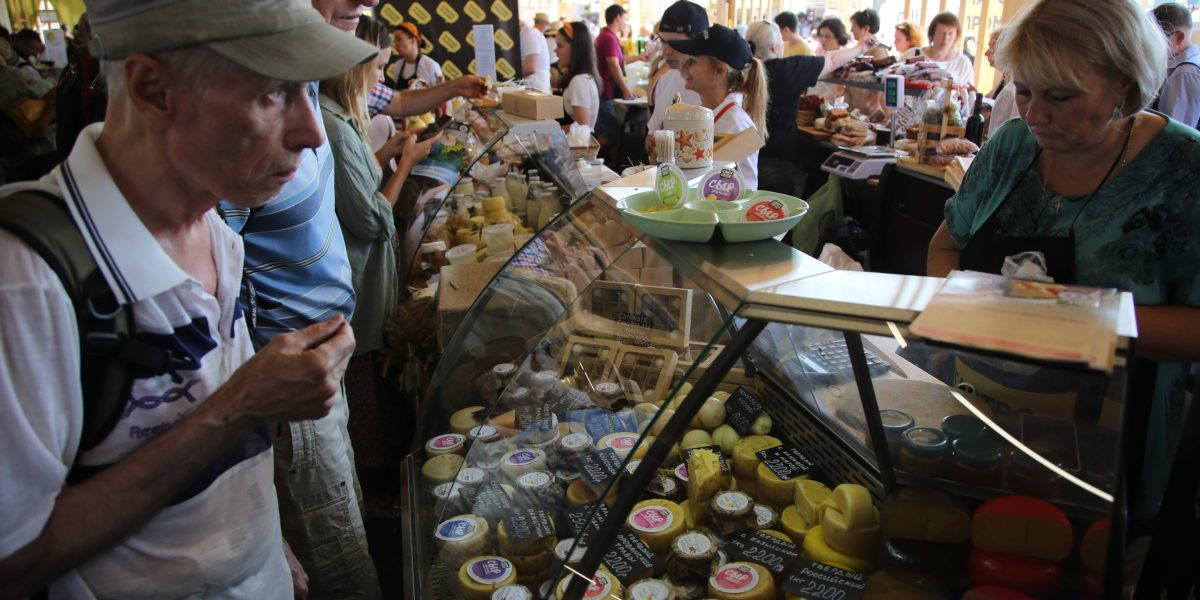
Russians are facing a surge in food prices, creating a headache for President Vladimir Putin as he tries to balance the Kremlin’s military ambitions with a desire for domestic stability.
A kilogram of potatoes is at least 73% more expensive than at the start of the year, while the price of butter has increased by more than 30%, according to data released by the Federal Statistics Service on Thursday. Those two products top the list compiled by the agency, with vegetables such as onions and beets up more than 20% and sour cream, milk, bread and fish all 12%-15% higher than 2023 levels.
Tatyana, a 72-year-old from the Russian city of Kirov, spends about two-thirds of her pension on food, up from about half previously, she said by phone. She’s had to all but stop buying expensive products such as exotic fruit, and for the first time since Russia’s 2022 invasion of Ukraine she won’t be able to afford the traditional New Year’s dish of red caviar.
Russians had been struggling with rising food prices even before this year’s surge, and Putin was inundated with complaints while hosting a citizen call-in event late last year. As the situation has worsened, officials from the Ministry of Agriculture to the Prosecutor General’s Office are concerned about how prices can be brought under control.
The Bank of Russia may struggle to come up with answers, having already increased its key interest rate to a record high of 21% last month. “The balance of inflation risks is still significantly tilted to the upside,” policymakers said at the time, while indicating a further increase is likely. The bank expects 2024 inflation to come in at 8%-8.5%.
In the shops of Kirov, about 1000 km (621 miles) northeast of Moscow, the situation is worse than the national statistics suggest, according to Tatyana. Staples like milk, butter, eggs and bread are at least twice as expensive as last year, she says.
Russian Prosecutor General Igor Krasnov has initiated a probe into price increases by milk producers and pledged a response. Prime Minister Mikhail Mishustin ordered the Ministry of Agriculture to ensure the availability of enough fruit and vegetables, while Deputy Prime Minister Dmitry Patrushev has demanded a daily monitoring of the food market and measures to stabilize the situation.
“All this fuss is being made so that the population associates food problems with the actions of producers and traders” and not with the consequences of the ongoing war with Ukraine, said Vladislav Inozemtsev, special adviser at the Middle East Media Research Institute. “When the price of butter was increasing even faster in 2007, no one in the government was worried.”
The Bank of Russia’s move to increase borrowing costs to cool demand is having a slight impact on inflation — annual price growth declined to 8.54% in September from 8.63% the previous month — but the ability of monetary policy to control food prices is limited. Food inflation remained above 9% in October, Federal Statistics Service data show.
That’s partly because the cost of logistics and production is growing, with the price of raw materials and supplies, livestock feed, fuel and many others on the rise. The ruble’s weakening and disruption of traditional supply chains due to war-related sanctions have caused some imported products to become scarce and expensive.
While the war in Ukraine has drawn workers from every industry to serve in the military, farming is among the worst affected. Agricultural Minister Oksana Lut has estimated the shortage of laborers at 200,000. A further blow has come from the impact of fluctuating weather conditions on harvests.
Limited opportunities to expand domestic production due to scarce personnel and outdated technologies has made Russia more dependent on imports. The country has started to import butter from Turkey and the United Arab Emirates, while Azerbaijan helped to eliminate an egg shortage earlier this year.
At a meeting on food prices this month, the Agriculture Ministry, Ministry of Industry and Trade and Federal Anti-monopoly Service recommended food producers and retail chains to cut prices on certain types of goods, according to Interfax.
“The main tool of the authorities is force. The authorities have a lot of experience in forcing producers and retail chains to adapt and adjust,” said Tatiana Stanovaya, founder of the consultancy R.Politik and a senior fellow at the Carnegie Russia Eurasia Center.
“But forceful pressure isn’t highly effective, or it’s temporary,” she said

